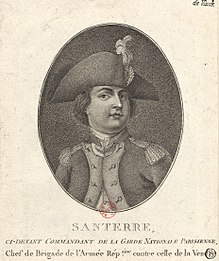Antoine Joseph Santerre
Antoine Joseph Santerre (born March 16, 1752 in Paris , † February 6, 1809 there ) was a brewer who rose to command of the National Guard during the French Revolution . He was in command of the Tuileries Tower on August 10, 1792, and secured the execution of Louis XVI on January 21, 1793 . militarily.
Life
The son and heir of a brewery entrepreneur from the Faubourg Saint-Antoine was one of the electors in Paris in the spring of 1789 and took part in the storming of the Bastille on July 14, 1789 . He then commanded the national guard of his district Enfants-Trouvés and accompanied the procession of the Poissards to Versailles on October 5 and 6, 1789 . A little later Santerre joined the Cordeliers' club . He survived the massacre on the Marsfeld on July 17, 1791 and then lived in secret for a few months.
On June 20, 1792, the wealthy, successful and popular beer brewer led the armed forces to the legislature and in front of the Tuileries to demonstrate against the king's veto, the inaction of the army and above all against the dismissal of the Girondist ministers. He also commanded the National Guard during the storming of the Tuileries on August 10, 1792, and on January 21, 1793, he was in charge of the military security for the execution of Louis XVI. In May 1793 Santerre joined the army and soon afterwards fought as Général de division against the insurgents of the Vendée .
After the defeat of the revolutionary army at Coron, the incompetent and wasteful commander was recalled from his duties on September 17, 1793. Santerre then joined Hébert's political supporters and was arrested after their overthrow in April 1794, from which he was only released after the overthrow of Thermidor II (July 27, 1794). He quit his service with the National Guard, only politically supported the coup d'état of the 18th Fructidor V (September 4, 1797) and has lived in seclusion ever since.
On February 6, 1809, Antoine Joseph Santerre, ruined as a businessman, abandoned by his wife and living in complete poverty, died in Paris. A plaque placed by citizens of his hometown at 9 rue de Reilly still commemorates him today.
literature
- Bernd Jeschonnek: Revolution in France 1789–1799. A lexicon. Akademie-Verlag, Berlin 1989, ISBN 3-05-000801-6 .
| personal data | |
|---|---|
| SURNAME | Santerre, Antoine Joseph |
| ALTERNATIVE NAMES | Santerre, Antoine-Joseph |
| BRIEF DESCRIPTION | Politician during the French Revolution |
| DATE OF BIRTH | March 16, 1752 |
| PLACE OF BIRTH | Paris |
| DATE OF DEATH | February 6, 1809 |
| Place of death | Paris |
